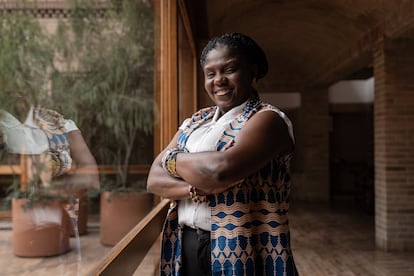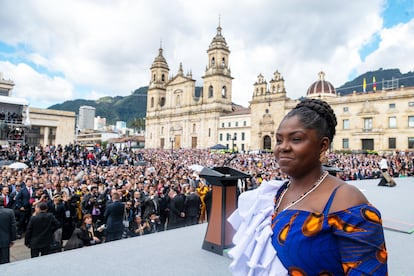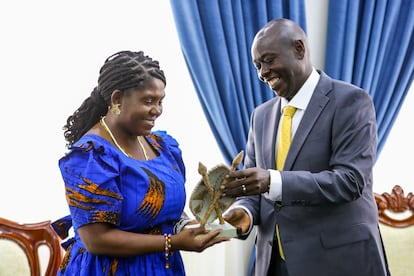Francia Márquez: ‘I’ve tried not to be awed by power’
The first Colombian vice president of African heritage discusses her first year in office with EL PAÍS


Francia Márquez, the first Colombian vice president of African heritage and the nation’s first Minister of Equality, has had a remarkable life. Born to a midwife in a small village in Cauca (southwest Colombia), she became a community leader to protect a local river from exploitation by a multinational company. Francia became a teenage mother who dreamed of marrying a white man and cleaned homes to put herself through law school. She faced many life-threatening challenges over the past 20 years, yet somehow secured an unexpected foothold in the realm of politics. However, little is known about her experiences as a leader and remarkable journey from resistance to authority. Beset by criticism and unfair expectations, the vice president sat down with EL PAÍS for a candid conversation about her first year in office.
“Interviews always make me nervous,” she said as she sat in one of the many armchairs of the enormous official residence of the vice president. It’s the same room where she made the symbolic gesture of meeting the domestic staff — those who often go unnoticed — when she first arrived. She has made other symbolic gestures since then, but transitioning from symbolism and activism to governance has proven to be challenging.
Gabriel García Márquez once said that important people are more scared during interviews than the reporters, and that an interview is as difficult as finding love. The vice president’s interviews this year have been disastrous. When asked about using a helicopter to travel home to Cauca, she said she was the vice president, so “too bad.” This drew heavy criticism and some wag even wrote a song about it. She was also lambasted in the press for her diplomatic tour through Africa, which critics called a “safari.” The vice president is often seen as arrogant and defensive. “Anything I say, they’re always trying to twist my words,” she said.
Question. Who is Francia Márquez now — as a person and politician — one year after taking office?
Answer. I’m essentially the same person, but sometimes I find myself wondering whether I’m working in government or advocating for a cause. I still believe in social justice and the transformative power of people to change lives and communities. However, life has changed a lot for my family. My mother can no longer live in her own home, and my children had to leave the country, which has been painful. The world of politics can feel empty and isolating, far from the sense of community and family I cherish. I live in this luxurious house, but I don’t find much happiness in that. Nonetheless, I made the decision to embrace the challenge of transitioning from resistance to authority, making dignity a way of life, all while supporting President Gustavo Petro.
Q. What has been the hardest lesson of this past year in office?
A. It has been a valuable opportunity to gain deeper insights into the workings of the government. In politics, you can find the best and worst aspects of human nature. We sometimes see pettiness and selfishness by the people who work in government. This has been particularly challenging for me, coming from a community that has always valued collective thinking. Engaging in politics and serving in government is a very different reality. It exposes us to egos, vanity and people who mistakenly believe that their position defines them. Resisting the allure of these temptations is vital to staying true to our values. We must not be captivated by the illusion that power creates. I have made a conscious effort to remain grounded, as the president once said in an interview. We live in a world where power can become addictive, and those who succumb to it ultimately lose themselves. Power sets traps, and we must stay vigilant to avoid falling into them.

Q. Have you ever felt like throwing in the towel?
A. No, I’m not there yet. It’s challenging to govern in a country that is so heavily influenced by machismo. Many women in government have told me, “I can’t handle it anymore, this is too hard.” Machismo permeates our government and society. However, these challenges haven’t made me give up. I’ve spent over 20 years surviving and I believe my vice presidency happened for a reason. I come from a town that has always faced challenges, with limited opportunities. This has made me fully appreciate my mission.
Q. You have said your life has been a struggle. How would you describe your current situation in the government, taking into account the egos and pettiness you mentioned earlier?
A. I appreciate the president’s unwavering support, which has been crucial. Our government is politically cohesive, unlike others where the president and vice president have had many differences. We have had disagreements, and I sometimes have to remind officials that I’m giving an order as the vice president. It’s unfortunate that I have to make this explicit, especially to male subordinates who assume their gender makes them superior to me and other women in government.
Q. Have you managed to win over the president? [During the campaign, Petro had a challenging relationship with feminism.]
A. Many women, including myself, have actively educated and changed the views of the president and other officials. Bold women who confront the men in our government and challenge their perspectives. We have become companions — an extended family with a lot in common.
Q. Speaking of family, the government is facing a scandal about the president’s son, Nicolás Petro. How do see the situation?
A. It’s a learning experience for everyone. The justice system will determine whether Nicolás [Petro] is guilty of the allegations. I won’t interfere there. But as a parent, I empathize with the pain the president and Nicolás’s family must be going through. I often think about what Nicolás’s mother and siblings are feeling — this situation affects their whole family. I try to build a wall between my work and my family — I have a rule.
Q. What is it?
A. My rule is, “This is a government matter. Don’t meddle, don’t give your opinion, don’t say anything because I don’t want you to be vulnerable.” My family has always been involved in social and community work, but never in politics. At times, there are people who deliberately provoke and set traps for me. People say things like, “Look, there’s an opportunity here — take it.” My answer is always, “No, I’m not interested.” Considering the offers I’ve received, it’s clear what they are capable of doing to my loved ones. So, I’m always cautious and vigilant for any trap that could harm me.
Q. This year you’ve been the target of a lot of criticism and even racist attacks.
A. As a public official, I understand the importance of being open to scrutiny about my work. However, what I’ve faced is not about my performance in office. It’s about who I am and what I represent. Sadly, this shows we have racism in our country, which is truly painful.
Q. One of the most recent attacks was about your official trip of Africa. You said this criticism was evidence of racial bias.
A. As a child, I grew up seeing Africa as a wild and miserable place, with malnourished children who had flies in their mouths. That’s what we were taught. When someone told me I looked like an African, I would fight back because I didn’t want to be associated with the negative stereotypes. However, that colonial perspective is inaccurate. After returning from that trip, I held a press conference and announced 17 agreements to establish bilateral relationships with the governments of those countries and their business sectors. However, the trip was heavily criticized for its cost. No other vice president or delegation has faced scrutiny like this before.

Q. They also criticized you for using a helicopter to travel home to Valle del Cauca. How did you handle that?
A. This is an opportunity for clarification. Whenever I speak firmly, I’m labeled as arrogant. This is exactly what writer Chimamanda Ngozi Adichie was talking about at the Bogotá Book Fair. She pointed out that when a woman talks tough, people say she’s loud and rude. But when a man does it, he’s seen as assertive and confident. These gender-based differences are a product of the patriarchy and influence how we are supposed to express ourselves. However, there are aspects of myself that I cannot change. Growing up surrounded by armed conflict, women in my community had to be strong and resilient. That’s my nature, my character, just like my mother and my grandmother. We are all women who refuse to be subservient.
Q. It all blew up when you said “too bad.” [When answering a question about the use of the helicopter, Márquez said she was the vice president and added, “too bad.”]
A. After I said that, I felt this torrent of aggression come crashing down around me. They’re always trying to twist my words. However, I wasn’t saying it to the Colombian people, but to some people [from the opposition] who think I shouldn’t have my position because they think they own the government. Many people in previous governments defended their own helicopter use, arguing that government resources are necessary for their families to move about freely and safely. My family doesn’t use helicopters or any other government protections.
Q. Let’s talk about your work as vice president and minister. What have been your accomplishments?
A. Extensive institutional strengthening initiatives have been launched, including the National Development Plan that consists of 25 distinct components. Additionally, the president has entrusted me to lead policy initiatives in the Pacific region [of Colombia], an area characterized by inherent inequalities that require transformation. Specifically, I have been fostering collaboration among institutions to ensure the fulfillment of commitments outlined in the 2017 agreement in Buenaventura, including budget allocations and the establishment of the Ministry of Equality.
Q. What have you not accomplished this year?
A. What’s missing? A lot. It’s unrealistic to expect to eradicate 500 years of exclusion, marginalization and violence in four years. However, we must establish the groundwork and implement crucial reforms in health care, education, labor and pensions. The lack of peace is an ongoing issue, with the armed conflict persistently affecting so many communities. It pains me deeply to see the unrelenting violence that we have yet to subdue.
Q. Let’s talk about the Ministry of Equality, which has been criticized for its enormous bureaucratic structure.
A. If our governments had focused on creating a coherent institutional framework and had adhered to the principles of the 1991 Constitution, which aimed to achieve more equality, our country wouldn’t be suffering from such deep wounds. Neglecting these aspects have produced a fractured society that needs to be rebuilt. It’s crucial to recognize that investing in equality and equity is not an expense but a worthwhile endeavor that requires the commitment of our entire society. Although it may seem like a daunting task, the size of this ministry reflects the realities faced by marginalized communities.
Q. It has a very broad scope: women, the LGBTQ+ community, poverty, ethnic groups, young people...
A. Women make up 52% of the population. When we took office, there was a council for women with a budget of five billion pesos [$1.2 million]. How do we address inequality with that budget? Many women suffer from gender-based violence due to lack of financial independence. Though we wanted a ministry, we began with a vice-ministry to develop policies and implement programs to eradicate this violence.

Q. How far along is the Ministry of Equality now? Do you have any female vice ministers yet?
A. In eight months, we successfully passed the law to create the ministry. Currently, we are in the process of institutional development, and are shaping investment projects, defining budgets, and selecting people to drive equity policy.
Q. Is it true that you will appoint a trans vice minister?
A. I want the vice-ministry of diversity, which includes the LGBTQ+ population and people with disabilities, to be led by a trans woman. I am currently searching for the right person and discussing this with the president, since we make these decisions together.
Q. Another controversial aspect of this new ministry is its approach to prostitution. What is your position?
A. It’s a necessary and valid debate that I won’t shy away from. Women who have experienced sexual violence, human trafficking, and forced prostitution have valid reasons to call for its eradication. And I wholeheartedly support that. However, there’s the reality that some women consider prostitution a job but lack proper healthcare and face societal alienation. All women deserve the government’s protection, regardless of their choices. Prostitution has been imposed by machismo, and I hope society will someday be free of all that. But until then, I must protect the rights of those fighting forced prostitution, as well as those who have opposing views, even if there are just a few.
Q. You are the first Minister of Equality in one of the most unequal countries in the world. What do you want to achieve by the end of your term?
A. By bridging the gaps of inequity and inequality, we can make significant progress. It’s not just the responsibility of the president and me — we need the collective commitment of the entire government and society to enact transformative change in our country. Let’s embark together on a path guided by the principles of social justice.
Sign up for our weekly newsletter to get more English-language news coverage from EL PAÍS USA Edition